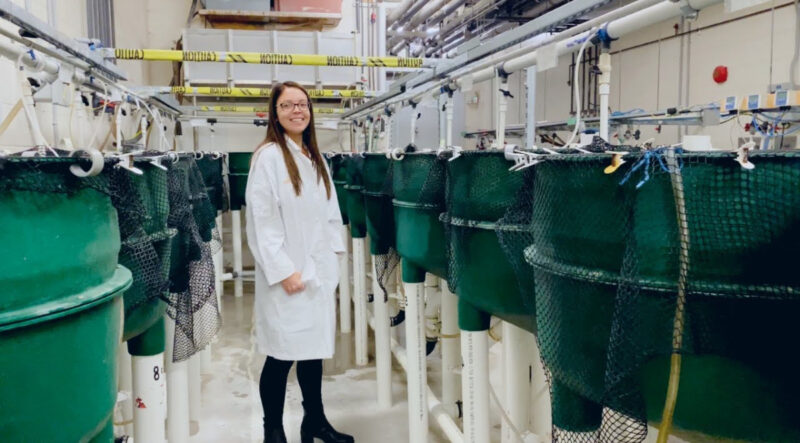Most Canadians support ocean-based salmon farming, aquaculture
While the federal government has been bowing to demands from anti-aquaculture activists, most Canadians see farming in the oceans as a sustainable way to harvest salmon, states a new survey from Dalhousie University
By Fabian Dawson
SeaWestNews
A survey of 10,000 Canadians has found that most of them believe that ocean-based aquaculture is a sustainable way to raise and harvest salmon.
The survey by Dalhousie University also contradicts a report commissioned by the Department of Fisheries and Oceans (DFO) which suggests that consumers would prefer land-based salmon farming, as they are also willing to pay premium prices, said researchers.
“Canadians appear to support ocean-farm production, in which salmon are hatched in tanks on land and then moved into pens in the ocean where they grow to about three kilograms,” the researchers said.
The findings come after the federal government announced last year that there would be a transition away from open net-pen farms in coastal B.C. waters by 2025, sparking debate over whether that could limit opportunities for the sustainable use of appropriate coastal areas for food production.
The Liberal Government, bowing to the science-deficit claims from anti-salmon farm activists has also decided to shut down 19 salmon farms in the Discovery Islands. The farms have been operating in the area for more than three decades and pose virtually no risks to migrating wild stocks in the area, according to nine recent peer-reviewed scientific studies by Canadian and international scientists.
The Discovery Islands decision, which is expected to kill 1,535 jobs, mainly in BC’s coastal and indigenous communities will see the province losing almost $390 million in annual economic output with $87 million less in annual salaries and benefits devastating an industry that supports 6,500 livelihoods.
Dr. Stefanie Colombo, lead researcher for the project and Canada Research Chair in Aquaculture Nutrition at Dalhousie University, believes the results point to how confused and misinformed Canadians are about salmon production.
“While the federal government often listens to interest groups, it appears Canadians see ocean farms as a very sustainable method of production, in addition to land-based production,” said Dr. Colombo.
“Exclusion of ocean net-pen farming in the future eliminates the opportunity for sustainable use of our coastline in appropriate areas for food production. Both production models will both continue to improve and evolve to produce sustainable, nutritious salmon for all Canadians,” she said.
Another aspect of the Dalhousie study found that personal income played a key role in their salmon consumption habits.
“People who earn more than $75,000 a year are more likely to eat salmon once a month, or more than people who earn less,” said the study.
Dr. Sylvain Charlebois, director of the Agri-Food Analytics Lab at Dalhousie, said a move to more land-based farms could potentially make salmon less affordable in the immediate future.
“If we motivate the industry to produce more salmon using land-based farms, we could potentially make salmon less affordable in the immediate future for a growing number of Canadians,” he said.
“Salmon is very much part of Canada’s new Food Guide, so affordability should be a priority.”
A government study has shown transitioning all open-net fish farms in British Columbia to land-based operations requires the use of large amounts of land, water, and power, and thus has a significant environmental footprint, in particular greenhouse gas emissions.
Raising land based salmon also costs 12 times more than ocean farming, studies have shown.
BC salmon farmers are currently developing new land-based systems that will allow them to raise juvenile farmed salmon to larger, more robust sizes before transferring them to ocean-based grow-out systems.
This will significantly lower the length of time that the salmon spend in the ocean, thus effectively reducing production and environmental challenges related to sea lice infestation and potential interactions with wild salmon stocks.
Authors of this report are recommending that the Department of Fisheries and Oceans consider all options based on scientific merit before enticing the industry to embrace one method of production versus another.
Here are some of the other key findings of the survey done by the Agri-Food Analytics Labat Dalhousie University, in partnership with Caddle;
- A total of 79% of Canadians do eat salmon, of which 10% will eat salmon weekly. Both Prince Edward Island and Alberta have the highest consumption rate at 84%. Boomers have the highest consumption rate at 84%, while Millennials have the lowest, at 72%.
- When asked why they do not eat salmon, the most common reason given by Canadians is taste. While 42% said taste is the reason that they do not eat salmon, 30% said it is because they do not eat any kind of fish. Price is an issue for 11% of Canadians.
- More Canadians will eat salmon at home (44%) than at a restaurant (8%). The Atlantic salmon is the most popular species among Canadians. While 38% of Canadians prefer Atlantic salmon, 33% prefer Pacific salmon which includes sockeye, pink, chinook, and chum species. A total of 29% do not have a preference.
- While a total of 21% of Canadians prefer to eat farmed salmon that has been raised on a land-based farm, a total of 39% prefer an ocean farm as a method of production. The support for ocean farms is clearly stronger amongst all groups.
- Only 26% of Canadians were aware that organic salmon existed.
- A total of 54% believe that aquaculture is a sustainable way to harvest salmon in Canada. When assessing Canadian’s perception related to salmon and production methods, Canadians appear to support the sustainable nature of ocean farm production. Nonetheless, our results suggest that 50% of respondents appear to misunderstand what land-based and ocean farm means. This contradicts the report commissioned by the Department of Fisheries and Oceans which suggests that consumers would prefer land-based farming, as they are also willing to pay premium prices.
(YouTube video screen grab of Dr. Stefanie Colombo)

